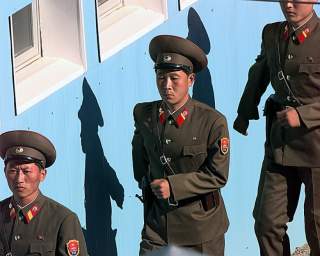North Korea: The Axis of Evil’s Last Man Standing
North Korea has proven stubbornly resilient—the last of an infamous cluster of rogue states.
Whatever happened to the axis of evil? With a speech etched in the memories of foreign policy buffs the world over, President George W. Bush in 2002 named three alleged state sponsors of terrorism as members of this inglorious (if amorphous) international cabal. Bush accused North Korea, Iran and Iraq of starving their citizens, exporting terror and attempting to amass stockpiles of biological, chemical and nuclear weapons—all insidious activities that put global security at risk. Indeed, Bush insisted that the very existence of these rogue regimes was inimical to U.S. and international security alike. Rulers in Pyongyang, Tehran and Baghdad were effectively put on notice.
Much has changed in the intervening years. Following its invasion and occupation by U.S.-led coalition forces (the rumored “first stage” in the remaking of the world order under the auspices of the Bush Doctrine) Iraq is now considered to be a U.S. ally in the Middle East—albeit one racked by internal division and currently under heavy assault by ISIS militants. U.S.-Iran relations are also undergoing a major overhaul, with touch-and-go negotiations over Tehran’s nuclear program holding out the distinct promise of Iran’s coming in from the diplomatic cold. While Tehran will never be a close ally of the United States so long as its present theocratic form of government persists, the prospect of a workable modus vivendi is at least in the offing.
Even America’s relations with honorary members of the axis of evil have eased since the first term of the Bush administration. Following the invasion of Iraq, Muammar Gaddafi agreed in December 2003 to dismantle his country’s weapons of mass destruction programs. Although Gaddafi was killed in 2011 amid the uprising against his rule, U.S.-Libya relations had improved significantly in the preceding half-decade: an embassy had been established in 2006 and Libya was officially removed from Washington’s list of state sponsors of terrorism. More recently, of course, diplomatic relations between the U.S. and Cuba are now in the process of being normalized.
North Korea stands out as an exception to all of this diplomatic drama. Far from showing signs of betterment, U.S.-North Korean relations have worsened since 2002. Pyongyang has: made significant progress towards developing a reliable nuclear weapons capability; launched deadly military attacks against South Korea; been linked with supplying the embattled Syrian regime with war materiel such as gas masks; recently carried out a successful cyberattack against a U.S. corporation; and remained impervious to outside attempts to pressure it into pursuing domestic reforms. The Bush-era multilateral framework for dealing with North Korea (the six-party talks) has disintegrated. Indeed, Pyongyang’s bargaining position vis-à-vis the U.S. might even be improving in light of closer ties being forged with Russia—an incipient patron-client relationship, perhaps, that will further reduce the ability of the U.S. to dictate terms to the Kim regime.
What can the U.S. do to reverse this trend of failure when it comes to North Korea? While new sanctions have just been introduced, the answer still seems to be: “not much.” Having witnessed the fates of Saddam Hussein and Colonel Gaddafi, North Korea (rightly) has concluded that a nuclear weapons program makes a fine guarantee against overt U.S. military coercion. Even putting the nuclear deterrent to one side, a military “solution” to America’s Pyongyang problem is unthinkable for as long as Pyongyang enjoys the pseudo patronage of China and, to a lesser extent, Russia. Economic sanctions against North Korea have thus far failed to bring the regime to heel, and a policy of conciliation is impossible for as long as the North Korean regime’s domestic grip on power is predicated upon a bellicose international posture. Meanwhile, isolating North Korea is an unsatisfactory solution to the problems at hand: the Kim regime would continue to tyrannize its people, militarily threaten its neighbors and pose a latent security threat to the United States.
In the end, however, this poverty of options for dealing with North Korea might not matter a great deal. For the truth is that American foreign policy towards North Korea is unlikely to be the deciding factor in the regime’s fate. While it is undeniable that the ranks of the world’s “rogue states” have thinned considerably over the past 13 years, the lesson to be drawn is hardly one of U.S. omnipotence. Regional and domestic dynamics—unpredictable social, political and economic forces that make for unwilling instruments of U.S. foreign policy—will be just as likely to secure North Korea’s demise as will any of the deliberate policies decided in Washington.
Of all the states namechecked in President Bush’s axis of evil speech, North Korea was and remains the most brutal and oppressive of them all. It is also the only one to have developed a bona fide nuclear weapons capability over the past decade. Yet North Korea has proven stubbornly resilient—the last of an infamous cluster of rogue states once singled out to bear the full force of U.S. diplomatic and military wherewithal. The limitations of U.S. ambition towards the regime are painful to observe.
Peter Harris is a Visiting Lecturer in Politics at Earlham College. You can follow him on Twitter: @ipeterharris.

